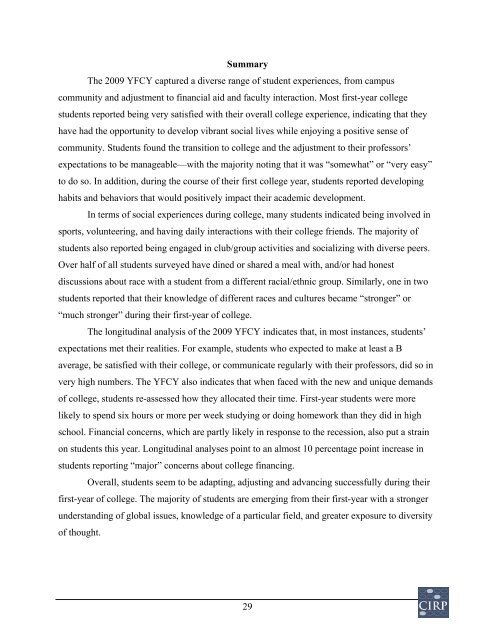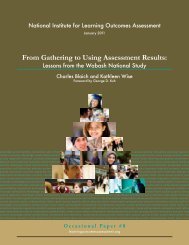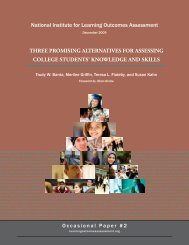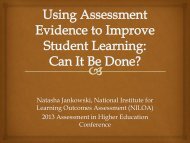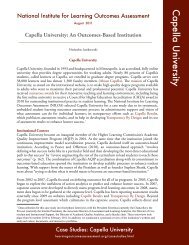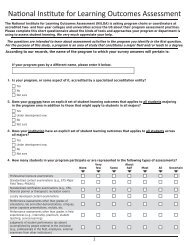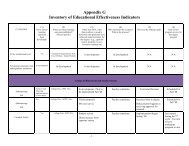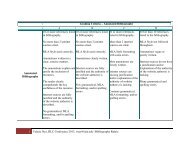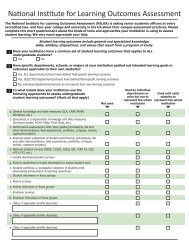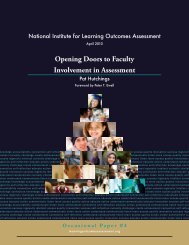Findings from the 2009 Administration of the Your First College Year ...
Findings from the 2009 Administration of the Your First College Year ...
Findings from the 2009 Administration of the Your First College Year ...
Create successful ePaper yourself
Turn your PDF publications into a flip-book with our unique Google optimized e-Paper software.
SummaryThe <strong>2009</strong> YFCY captured a diverse range <strong>of</strong> student experiences, <strong>from</strong> campuscommunity and adjustment to financial aid and faculty interaction. Most first-year collegestudents reported being very satisfied with <strong>the</strong>ir overall college experience, indicating that <strong>the</strong>yhave had <strong>the</strong> opportunity to develop vibrant social lives while enjoying a positive sense <strong>of</strong>community. Students found <strong>the</strong> transition to college and <strong>the</strong> adjustment to <strong>the</strong>ir pr<strong>of</strong>essors’expectations to be manageable—with <strong>the</strong> majority noting that it was “somewhat” or “very easy”to do so. In addition, during <strong>the</strong> course <strong>of</strong> <strong>the</strong>ir first college year, students reported developinghabits and behaviors that would positively impact <strong>the</strong>ir academic development.In terms <strong>of</strong> social experiences during college, many students indicated being involved insports, volunteering, and having daily interactions with <strong>the</strong>ir college friends. The majority <strong>of</strong>students also reported being engaged in club/group activities and socializing with diverse peers.Over half <strong>of</strong> all students surveyed have dined or shared a meal with, and/or had honestdiscussions about race with a student <strong>from</strong> a different racial/ethnic group. Similarly, one in twostudents reported that <strong>the</strong>ir knowledge <strong>of</strong> different races and cultures became “stronger” or“much stronger” during <strong>the</strong>ir first-year <strong>of</strong> college.The longitudinal analysis <strong>of</strong> <strong>the</strong> <strong>2009</strong> YFCY indicates that, in most instances, students’expectations met <strong>the</strong>ir realities. For example, students who expected to make at least a Baverage, be satisfied with <strong>the</strong>ir college, or communicate regularly with <strong>the</strong>ir pr<strong>of</strong>essors, did so invery high numbers. The YFCY also indicates that when faced with <strong>the</strong> new and unique demands<strong>of</strong> college, students re-assessed how <strong>the</strong>y allocated <strong>the</strong>ir time. <strong>First</strong>-year students were morelikely to spend six hours or more per week studying or doing homework than <strong>the</strong>y did in highschool. Financial concerns, which are partly likely in response to <strong>the</strong> recession, also put a strainon students this year. Longitudinal analyses point to an almost 10 percentage point increase instudents reporting “major” concerns about college financing.Overall, students seem to be adapting, adjusting and advancing successfully during <strong>the</strong>irfirst-year <strong>of</strong> college. The majority <strong>of</strong> students are emerging <strong>from</strong> <strong>the</strong>ir first-year with a strongerunderstanding <strong>of</strong> global issues, knowledge <strong>of</strong> a particular field, and greater exposure to diversity<strong>of</strong> thought.29


